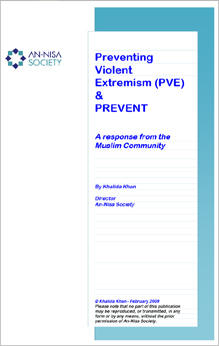
Author: Khalida Khan
Publisher: An-Nisa Society
Release Date: February 2009
Pages: 37
Source: No longer available on the website
This report has been prepared by a long-standing Muslim activist group based in North West London with deep roots in its local communities. The An-Nisa Society, “a women managed organisation working for the welfare of Muslim families” has a track record that dates back to the mid 1980s. It has displayed persistence and dedication in activities such as supplementary week-end activities for young Muslim boys and girls, increasing health awareness, tackling difficult subjects such as domestic violence, and conducting other service delivery programmes.
If an organisation like this reaches the conclusion that Government approach of overlapping a security agenda with community development is “flawed and fraught with perils”, then it is time that the policy makers and civil servants stop in their tracks. It is no wonder that the Economist recently headlined an article dealing with Muslims in Britain ‘How the Government lost the plot – A desperate search for a new policy towards Islam has yet to produce results’ (February 26, 2009).
The conflation of tackling terrorism – a security and crime problem – with improving community cohesion – an issue of dealing with inequalities and social exclusion – stems from the Government’s Preventing Violent Extremism (PVE) programme, launched in April 2007 by Ruth Kelly, then Secretary of State for Communities & Local Government. At the time she announced a “new action plan to step-up work with Muslim communities to isolate, prevent and defeat violent extremism”, in a document entitled ‘Preventing violent extremism – Winning hearts and minds’.
The An-Nisa Society report provides a critique of PVE, written with an insider’s knowledge. The group itself was recipient of some funding, for a project on self-development work with Muslim boys in the London Borough of Brent. Its first-hand interaction with young Muslim boys led it to conclude that “the government needs to take on board that it is not possible to deliver ‘security led’ initiatives through Muslim community groups as (a) it damages trust and credibility in frontline grassroots work and (b) it does not address the wider issues that have created the problems in the first place. Security needs to be addressed separately by experts in this field” (project report ‘British Muslim or Wot?’, March 2008).
An-Nisa’s 2009 report makes an impassioned plea for the need for a “resourced and experienced Muslim voluntary sector, which will work in partnership with local councils and other agencies…generally speaking we do not have a viable Muslim voluntary sector, which has the ability, due to lack of experience, sustained funding and capacity, paid staff and premises to (a) support the Muslim community in taking a ‘lead’ on matters/issues that concern it rather than having things ‘done’ to it; (b) make the government, local authorities, police and others accountable; and (c) lead on or work in partnership as equals with mainstream agencies such as providing expertise and support services within the community. As a result there is a danger that local authorities and the police will set the agenda and unaware and inexperienced local Muslim communities will allow actions to be taken without full knowledge of the implications and that may be possibly against the community’s interests”.
About £90 million of taxpayers money has been spent on PVE. It takes courage for a recipient to stand up and expose a flawed policy. It is sad that warnings by informed commentators like Madeleine Bunting were not listened to years ago: “It is crucial to delink terrorism from the integration and diversity agenda. They have nothing to do with each other, so nail the myth – perpetrated by politicians and commentators – that integration is an anti-terrorism strategy….So go back to basics and reiterate that integration is about equality of opportunity, breaking down intergenerational cycles of poverty, and harmonious social relations. These goals may – or may not, depending on international affairs – reduce the appeal of terrorism in the long run, but any serious government should be interested in them in their own right, not simply as a means to the end of defeating terrorism” (writing in The Guardian, 4th December 2006).
The flawed PREVENT policy has led to the stigmatisation of a whole community as ‘suspect’ and potential terrorists.
